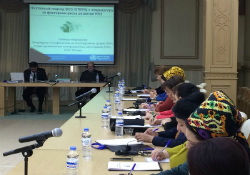Kazakhstan and Turkmenistan to conduct nationwide surveys to study NCD risk factors

WHO
Kazakhstan and Turkmenistan are preparing to conduct nationwide STEPwise approach to surveillance (STEPS) surveys to study the prevalence and patterns of noncommunicable disease (NCD) risk factors in their populations.
To support the implementation of the country surveys, WHO trained national teams on the STEPS methodology and tools. The survey results will support countries’ surveillance and monitoring systems by generating high-quality and comparable data on the main determinants and risk factors of NCDs at the national level.
WHO STEPS survey
STEPS is an internationally comparable, standardized and integrated surveillance tool through which countries can collect, analyse and disseminate core information on NCDs. It involves the use of detailed questionnaires on the health behaviours and NCD-related medical histories of households’ members, as well as the collection of physical measurements and the biochemical assessment of blood and urine.
The standardized questions and protocols of the survey enable countries to monitor national trends and develop integrated information on NCD risk factors. They also enable comparisons across countries that help to identify good practices and inform the development of targeted policies and programmes.
STEPS survey in Kazakhstan and Turkmenistan
Both countries plan to implement the STEPS survey in 2018. This will be the second round of a nationally representative STEPS survey for Turkmenistan, which will allow for comparisons of survey results over time and in relation to the implementation of NCD policies. It will be the first nationwide STEPS survey for Kazakhstan. Previously, the country implemented the survey in 2 pilot regions.
A WHO team supported the countries in the survey planning process, and by training national teams on the sampling, data collection, data management, analysis and reporting stages. The workshop in Ashgabat, Turkmenistan, on 29 October–1 November 2017 involved 20 participants from the national survey coordination team and the WHO Country Office.
The workshop in Astana, Kazakhstan, on 6–7 November 2017 involved 16 participants. They learned about the overall STEPS approach and the experiences and perspectives of other countries in the WHO European Region that recently conducted STEPS surveys. Comparisons with neighbouring countries are expected to provide indications of what policies work well and how they are implemented.
WHO supports countries in STEPS implementation
The WHO European Office for the Prevention and Control of Noncommunicable Diseases (NCD Office) provides technical, financial and material resources to support Member States in the Region in the implementation of STEPS surveys.
Eleven eastern European and central Asian countries have already conducted these surveys. By the end of 2018, NCD surveillance coverage with the STEPS survey will have reached nearly 200 million people in the Region overall, or around 25% of the entire population.



